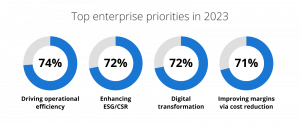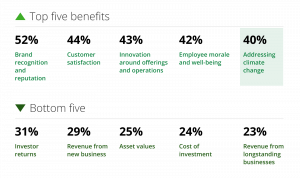With customer experience now driving brand loyalty, organizations are beginning to focus heavily on making corporate social responsibility a part of an organization’s procure to pay solution. A company’s ethics are becoming critical differentiators in the global market. As organizations seek to strengthen their social value, they are building capital on traits like fairness, honesty, sustainability, and community. Companies are also searching for innovative ways to turn profits using socially and environmentally responsible methods.
Promising to run a business with a higher purpose means that you always have to walk the talk. Your public identity, market placement, and growth potential depend on your ability to consistently follow ethical standards for buying, partnering, and staffing. For instance, if your mission contains an environmentally conscious charge to lower your carbon footprint, then your procurement team should focus on exclusively sourcing sustainable, non-toxic materials from vendors who share similar values.
In order to integrate corporate social responsibility within procurement processes, you need to have a clear outline for how to match your policies to your philosophies. You must equally prioritize social, economic and environmental impacts alongside price and quality. 70% of CEOs believe ESG improves financial performance. Companies that do this well are outperforming their competitors with significantly higher financial rewards, reduced employee turnover, more transparent supply chains, and deeper brand connections.
Perceived Pitfalls of Corporate Social Responsibility within Procurement
More procurement leaders are strongly prioritizing the management of corporate social responsibility and ESG, according to Deloitte’s Global Chief Procurement Officer Survey.

Source: Deloitte
Honorable corporate goals is now the second biggest priority along with digital transformation – highlighting the importance of implementing CSR in procurement. In 2021, ESG and CSR only ranked seventh on the priority list for Chief Procurement Officers. However, challenges abound for many organizations.
Difficulty in measuring environmental impact, cost, and focus on urgent business issues and demands are the biggest obstacles in sustainability efforts.

Source: Deloitte
Procurement is already a complicated beast. It not only entails careful vendor vetting, talent acquisition, material selection, and contract negotiation, but strategies also radically change with supply, demand, and regulations. Many organizations understand the importance of corporate social responsibility but they shy away from running purposeful businesses because leaders believe it escalates costs, complicates processes and intensifies stress.
The job is large, and it requires unique procure to pay software solutions for building buy-in, enforcing standards, changing buying behaviors, encouraging socially responsible procurement, and tracking progress on your procurement initiatives. This journey toward corporate social responsibility within procurement practices will become overwhelming if you take on too much too quickly. Instead, start with small changes that easily fit within your company culture.
Developing Sensible Sustainability Procurement Programs
There is a global revolution toward integrating sustainable procurement programs into corporate social responsibility missions. Many companies have begun by launching projects to comply with regulatory changes in the U.S., Canada, Europe, and Asia. Most often, these efforts focus on addressing environmental concerns. Companies evaluate their strategies for engaging in ethical sourcing and clean emissions practices. Green procurement policies generally include buying recycled paper products, upgrading to energy efficient lighting and shrinking product packaging. Companies also focus on socially responsible sourcing by becoming purposeful in choosing their vendors for office supplies, furnishings, and equipment.
Others are finding creative ways to leverage the associated social benefits to strengthen brand recognition and inspire innovation while reducing costs and managing risks. Another element of CSR in procurement is seeing leaders focus on nurturing a sustainable economy to stabilize incomes and promote local development. These socio-economic policies are often concerned with fair trade practices, diversity purchasing, screening vendors, measuring sustainability impacts, streamlining processes and promoting healthy work-life balance.
Many companies are tackling significant pain points, such as poverty and diversity, along the supply chain journey. By investing in procure to pay software, businesses can easily embed corporate social responsibility within procurement efforts every day, in a seamless, frictionless manner. The software empowers buyers to increase their savings while making real contributions to a world problem through the products and vendors that they choose.
Achieving the Benefits of Being Socially Responsible in Procurement
Companies that are able to combine all three approaches have the best opportunity to meaningfully impact people and the planet. This holistic approach to corporate social responsibility within procurement means that you fully accept responsibility for the services that you provide and the products that you sell. This accountability extends to all phases of sourcing, production, distribution and waste management, and it requires an unwavering commitment to upholding your ethical standards.
It is critical to figure out how to gain buy-in from company decision-makers, buyers, vendors, and customers since resistance to changing behaviors is common. The most effective programs are set up with clear standards that are widely shared across the supply chain. Reward programs that incentivize participation may be necessary to get momentum moving, and they are especially helpful in motivating continued commitment. You will also need to create processes for onboarding new vendors and develop technology systems for tracking progress and mitigating risks.
As purpose-driven companies are discovering, the efforts are well worth the rewards. More than half of organizations indicate brand recognition and reputation to be the top benefit of sustainability efforts. 31% also reported investor returns while 29% cited revenue from new business

Source: Deloitte
This is largely due to an improved image with all audiences, including employees, customers, stakeholders, and outsourced vendors. Companies who are socially aware are also more likely to attract top talent, which infuses the workplace with greater innovation.
Additionally, clearer transparency in the supply chain not only brings everyone on board with expectations but also nurtures stronger collaborations. Yet 17% of Deloitte survey respondents dubbed as followers have visibility at Tier 2 while 40% of top performers have visibility at this level.
E-procurement software will drastically improve your ability to monitor suppliers and manage relationships with them. In other blogs, we have discussed both how to improve your supplier relationship management and supplier compliance.
Continually reinforcing the message that digital tools are driving the future of procurement, Deloitte also urges the adoption of technology that promotes proactive, predictive, smarter and automatic procurement transactions in order to achieve their socially responsible goals.
There are many reasons for organizations to strongly prioritize corporate social responsibility within procurement. It may be in order to comply with regulatory changes, strengthen brand recognition, reduce costs, manage risks or promote local development. With many benefits to be achieved from recognizing the importance of social responsibility, CSR in procurement will undoubtedly become a stronger priority for more organizations.


